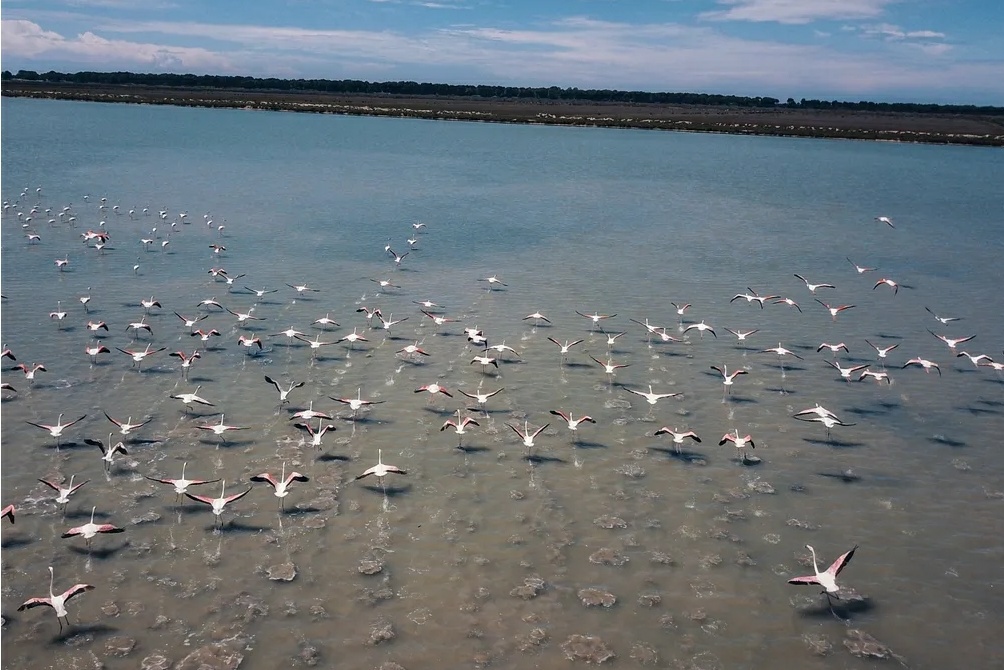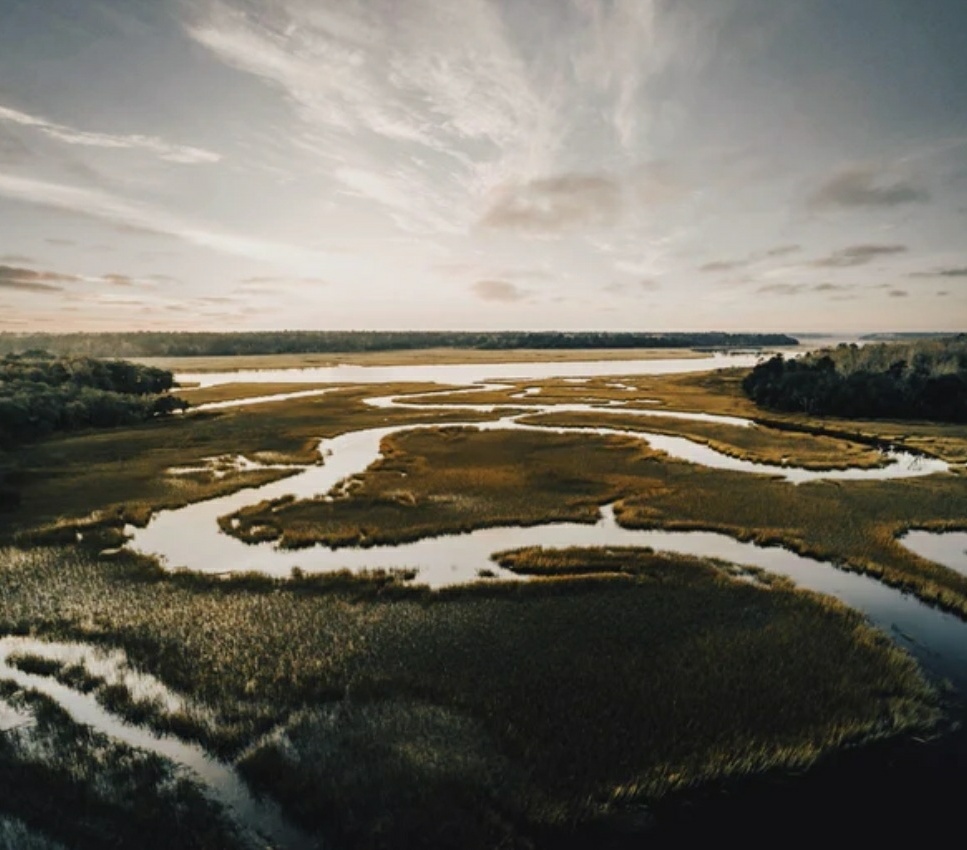

Rafaela Prifti/
The controversy surrounding Vlora airport has reached Albania’s court system as the efforts by the plaintiffs AOS and PPNEA intensify. Albanian Ornithological Society (AOS) and Protection and Preservation of Natural Environment in Albania (PPNEA) the two Albanian environmental agencies that have sued the government are expecting a ruling soon on the issue of permission to restrict the areas previously granted protective status by Albania’s legislature. Vlora International airport which was scheduled to open in April 2024 is now expected to be operative in 2025 as battle plans are taking shape at local communities, NGO boards and the upcoming EU Summit. There is no denying that the stakes are very high.
Who stands to gain from the Project? “Vlora airport will allow holidayers to fly directly to Albania’s coastline for resort holidays on the Adriatic Sea, potentially boosting development and tourism revenues,” Guardian reports on July 20, 2023. The supporters of the airport that will host direct international flights tout the economic benefits in tourism boon and expected gains in creating jobs along Albania’s coastline. The government and Prime Minister Edi Rama have been the driver of the Project hoping to deliver on promises made “for the region’s most important tourist gateway.” On the other hand, the critics have serious concerns in terms of its sustainability, aviation and public safety and particularly the government’s violation of Albania’s Protected Areas Legislation. Additionally, if the project moves ahead, it could potentially open the door to a long line of so called “strategic investments” on the Albanian seacoast, a prime tourist attraction, particularly the Adriatic corridor, severe harming the wildlife, the habitat and the coastal region at large.
Aside from the enormous importance of the conservation value of the Vjose Narte area, the move to allow an international airport in extreme proximity forebodes dangers and more threats. The construction of the airport, approximately 5 kilometers (3 miles) from the bird sanctuary, hints and invites further developments in the area. There is a lot of evidence and information on the bird species, endangered or in decline, in the Vjose-Narte lagoon, a key stop for birds in the annual migration between Europe and Africa. The mission of AOS (https://aos-alb.org/) and other environmental NGOs is to protect and enhance Albania’s biodiversity, nature and environment while working closely with the stakeholders to ensure the sustainable use of natural resources.
Taulant Bino, Director of Albanian Ornithological Society (AOS), sees a pattern taking shape with regard to encroaching the state-owned protected areas. The AOS is one of the two national environmental NGOs that has filed a lawsuit against the government over the construction of the airport. Specifically, the airport borders the Narta lagoon renowned for its birdlife according to the AOS. Founded in 2015, AOS has complied data that will be presented to the government in a detailed report in support of the suit that aims to protect areas of importance for conservation, says Taulant Bino. In a Zoom interview with Ardian Murraj, Worcester based freelance reporter and UPAJD (Union of the Professional Albanian Journalists of Diaspora) member. Mr. Bino explains that safety issues concern not only the fauna but also the aviation industry prone to bird accidents. The data gathered clearly demonstrates that the international airport is unsustainable, he says. The Guardian report highlights the risk of creating another unsustainable resort bubble that fails to entice tourists to inland destinations. One example of it says Bino would be the ghost beach town of Durres and Golem area.
The irony is not lost on Bino that “protected areas need protection in Albanian” and that environmentalists are at the front of this fight.
Vjosa River was officially declared a national park by the Albanian government, a conservation victory in the Balkans. On those grounds, the Bern Convention – a European Council agency, objected to the construction of hydro-power plants on Vjosa. On its official posting, the agency states that “arguably one of the most important parts of the river, the delta, protected area of Vjosa-Narta, is excluded, allowing for the construction of Vlora airport, despite the Bern Convention Standing Committee calling in 2022 for the suspension of this project which will affect millions of birds and their habitats.”
The government is walking away from previous promises of eco-tourism as evidenced in the current plans for an international airport instead of other alternatives, comments Bino.
Are there alternatives? Yes! Repairing the railway, ferry crossing or opening a local Vlora airfield would be environmentally responsible options in light of the fact that there is roughly a two-hour-long drive between Tirana, Albania’s capital, that hosts international flights, to Vlora. Bino understands and appreciates the benefits of tourism but advices to support local tourism rather than sprawling resorts that have proven to be disastrous for the national resources and communities. “Since the Protected Areas Act was passed about ten years ago, there has been a growing push by the stakeholders to reverse, reduce or restrict the protective status of the wetlands and lagoons that are of critical conservation value not only to Albania but the region at large.”
The increased pressure by the government and developers needs to be countered with similar concerted efforts by the national environmental agencies. “Our work is constant and never ends,” says Bino, who is not discouraged by the odds. To be sure the environmentalists “have gone to battle” previously and scored a victory in thwarting developments in the Divjake Karavasta Natural Park. No two projects are alike but the NGOs rely on their expertise, the law, education campaign, constant engagement with the community, international partners in the EU and media. Notably Bino says there isn’t much support and coverage by the local media. Some projects get more attention than others, for example the hydro power projects are more in the public eye lending them more support from the community and diaspora than the conservation of bird species in the country’s western wetlands.
While the flooding of villages and sites of historic importance as in the case of Skavica is easy to visualize and protest against, one doesn’t need to be a birdwatcher to know that birds are indicators of the environment, whose fate is intrinsically connected to humans. The Narta lagoon and its sorroundings comprise more than 19,000 hectares (47,000 acres) in Albania’s south represent one of the largest and most important wetland ecosystems in the Mediterranean – a crucial biodiversity area with more than 200 bird species including flamingos, pelicans, herons. Environmentalists like Bino are heartened by the engagement of the EU agencies and partners while preparing for the long odds ahead.
As the case works its way through the court system in Albania, the Bern Convention known as the Convention on the Conservation of European Wildlife and Natural Habitats takes place on September 12-13, 2023. The body has called for the suspension of the Vlora airport (https://www.coe.int/en/web/bern-convention/-/2nd-bureau-meeting-2023). The summit provides a stage for all the stakeholders allowing the government and the conservation professionals to make a case in the presence of the European Council agency, a powerful ally and advocate of national NGOs across Europe.